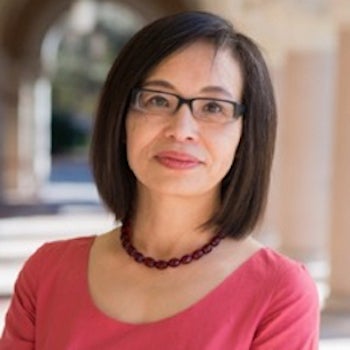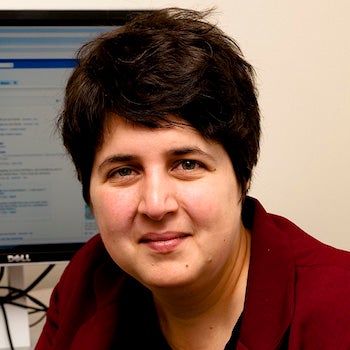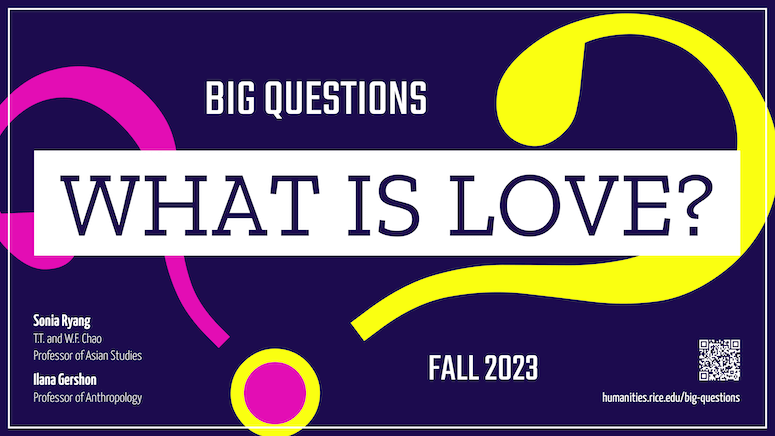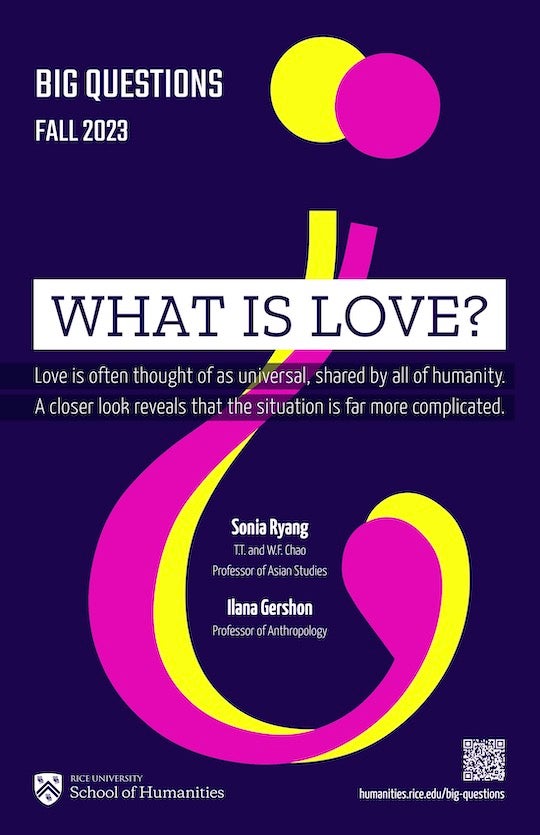The idea of love is a concept we often think of as universal, an idea all humans can relate to in a similar fashion, no matter their backgrounds. But is that really the case?
This fall, Rice professors Sonia Ryang and Ilana Gershon will ask Rice students a far-from-simple question — What is Love? — in their upcoming course of the same name, the latest offering in the Big Questions class series sponsored by the School of Humanities.
Ryang, the T.T. and W.F. Chao Professor of Asian Studies in the School of Humanities, and Gershon, professor of anthropology in the School of Social Sciences, first met as graduate students at Cambridge University years ago, so the opportunity to teach this class together is an exciting milestone for the two colleagues and friends.
“What this course is going to be about, and why we’re excited about teaching it, is that we get to ask how all these culturally different communities use love to shape the ways that people interact with each other and how they get people to do things,” Gershon said.
“It’s a great opportunity to get the two schools to work together,” Ryang added, expressing her excitement about how the course will introduce Rice students to the broader tenets of both the humanities and the social sciences.
Gershon and Ryang will guide students through interrogating how different cultures consider all aspects of love — familial, platonic, romantic and everything in between — and will touch on contemporary issues of the political implications of different manifestations of love, bringing in topics as wide-ranging as the purpose and value of marriage in differing cultural and historical contexts, the politics of LGBTQ+ love and a consideration of reproductive rights through a love-inflected framework.

Along the way they’ll employ a number of unique assignment ideas, from giving students the opportunity to write out fictional interview transcripts with inanimate objects chosen by students that connect to love (inspired by the popular podcast “Everything is Alive”) to letting them write love letters from the perspective of fictional characters, be they from a cat owner to their feline companion, from a parent to a child (or vice versa) or from star-crossed lovers from television, film or novels.
Both scholars have grappled with ideas around love as an ideological, historical and social construct and the myriad ways it manifests itself in past and present societies. Ryang previously taught a course on the anthropology of love during her time at Johns Hopkins University and the University of Iowa, and her work analyzing Korean and Japanese culture has touched on how love functions as a political-yet-visceral means to mobilize individuals toward national cause.

Gershon’s anthropological research — focused primarily on the United States and embodying her broad interests in the intersections of politics, linguistics, media and technology — has asked similar questions of the many ways and forms in which love is conveyed, experienced and, at times, even weaponized. For example, her 2010 book “The Breakup 2.0: Disconnecting over New Media” and its follow-up publication “The Breakup 2.1: The Ten-Year Update” delve into how using technologies designed to connect, such as the modern internet, social media platforms and communications technology including smartphones, texting and messaging apps can reveal widespread cultural assumptions when American college students use them to end romantic relationships.
Ryang is thrilled at the prospect of having some of Rice’s many STEM-studying students in the classroom, both to draw from their unique perspectives and to help expose them to the humanities and to interdisciplinary modes of inquiry more broadly — the Big Questions series’ overarching objectives.
“Thinking about your upcoming careers, whether you’ll be dealing with fintech, quantum mechanics or protein modeling, wouldn’t it be nice to have one semester to think about love while you’re in college?” Ryang posed to such students.
“We take love, so much, for granted,” Gershon said. “We think we know what it is, and we think we know what it means to have it dissolved. But actually, it’s so culturally specific, and it’s so bound to particular kinds of ways in which we have families and ways in which we have nations.
“This is a course that allows you to take a step back and ask, ‘What are the benefits and costs of having love experienced this way, as opposed to other ways?’” she continued.
For more information on What Is Love? and Big Questions courses past, present and future, visit humanities.rice.edu/big-questions.


